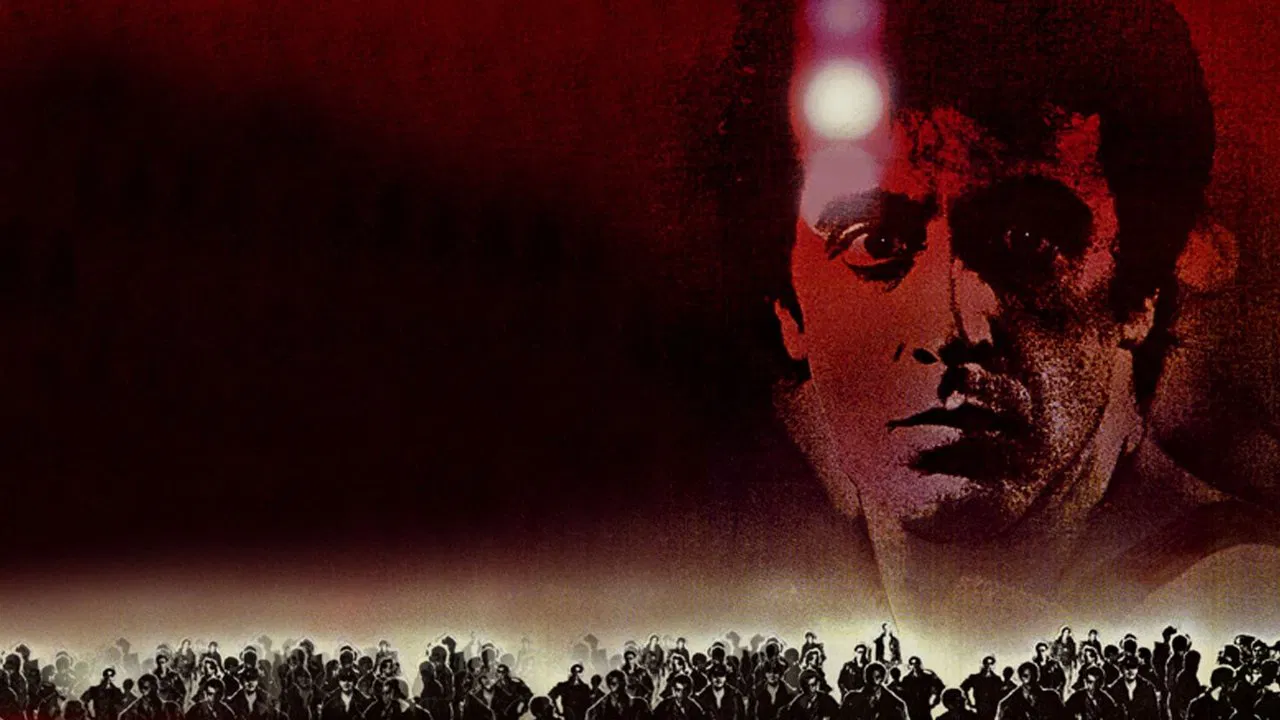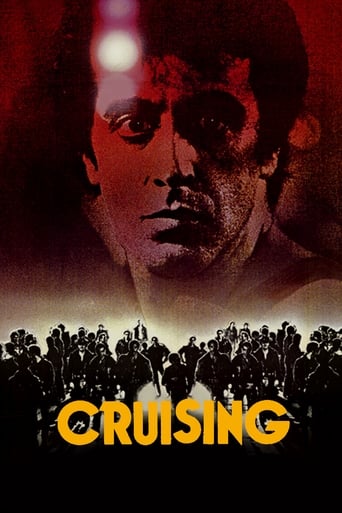

So was Cruising supposed to be a thriller? Or was it about one man's gradual "descent" into a subculture which is looked down upon by society and the police department that employs him? Friedkin has a tough job on hand - he is making a thriller, so the film needs the thrills and the twists. But he is also making a film about a cop who is gradually attracted to the lifestyle of the people he is spying on. Friedkin does not do a good job handling these two aspects of the film or stringing them together. In the end, Cruising is neither a great thriller not a great character study.I really wanted to like this movie. I was waiting for the enthralling scenes where Pacino turned it on. But instead you have many scenes with Pacino casually walking into an underground gay bar and looking around at the debauchery going on around him. It is almost like Friedkin is saying - look, this is all so provocative. But the blatant scenes of debauchery leave you cold rather than shocked. Friedkin did such a great job gradually building up the changes in Regan's personality as she is taken over by Demon Pasusu in The Exorcist. But there is none of that ingenuity in Cruising. A bit of subtlety would have helped the movie. Instead, you are hit on the head with all the gay sex scenes. The hard rock music played during the scenes in the bar are cheesy. And so are the actors who play the gay men taking part in the debauchery.Also, Pacino is introduced a good fifteen minutes into the film. We know nothing about him. Is he a conservative cop? Does he dislike gay people? We are told literally nothing about this character.The scenes which indicate Pacino's increasing attraction to the S&M scenes are few and far between. They are quite flimsy as well. The ambiguous ending was a bit hard to believe. There is nothing that came before the ending that adds any weight to the ambiguity.Sorvino and Pacino seemed to be sleepwalking through their roles. Pacino is really good in some of the scenes (like the one where is dancing with a patron at the bar. That was intense.). But he is nowhere as intense as he is in Serpico. The scene with Powers Boothe was quite funny. But another one where Pacino is told off by a patron at the bar came across as trite.We do get a good look around New York. The film made me wonder what it would have been like to live in a great city like that in the 70s and 80s. A city that gave the opportunity to a man to become whatever he wanted to be.Norman Mailer wrote (in Tough Guys Don't Dance) that people become cops to escape the criminal or deviant inside them. I guess Pacino's character in the movie confirms to this view.
... View MoreThis film was important when it came out in 1980. We were just before the AIDS pandemic hit the world. In New York the gay scene had crossed the line of simple ordinary cruising to enter the hard line of sado maso sex, leather paraphernalia and a certain amount of constraint, force, violence, etc., what some call authoritarian gay sex. In that scene criminal violence is then a lot more difficult to trace and find out because it does not stand out "like a sore thumb" but gets blended in the surrounding violence.One serial killer is running on that stage in New York and to pick him, to find him out a cop has to be sent undercover. He is young, handsome, not gay at all, and yet he is going to get into the gay business. He finds out that this cruising is first of all attractive because it deals with feelings that are not satisfied otherwise: love, friendship, equal force and equal power. It is more some accompliceship than real sensation or emotion. The lovers meet halfway in the project of being as strong as the other, of submitting the other and be submitted to the other by this other precisely. This narcissistic fascination, this love for the other who is my equal and to whom I must submit to be his equal because he submits to me to be my equal – submission, domination and yet total communion and equality. This side is actually not explored enough in this film, except of course occasionally when the undercover cop meets with his next door neighbor the playwright. But that is little and it will end badly anyway because in such a situation jealousy and possessiveness are the two main characteristics of some couples who cannot accept any intruder, in spite of the fact that the gay bars are necessarily open stages and open situations. For some to get into a relation is also to get out of all opportunities to meet with another possible relation, the rejection of any promiscuity. That is not typical of the gay scene but men have not been used to being dominated by their partners for something like 300,000 years like women. Such situations can become very nasty.The film exploits another line without giving all the details. The serial killer was rejected by a father who, we understand, refused his gay orientation and required that he should change orientation in order to be given the support he wants. Unluckily it is suggested that the father has been dead for ten years. Hard on the chap who has not been able to prove himself to his father and is out in the wild without a father behind him, except as a phantasm to whom he writes hundred of letters, every week or so, without sending them, of course. Then we enter the field of perversion, rather simple actually, maybe too simple. He uses his sexual orientation to capture a prey, has sex with, complete or partial sex, it does not matter, and then he kills his prey who "made him do this." It sounds simple because it is not explored enough. It is true we were in 1980 and that was a long time before profiling became popular, a long time before "Criminal Minds." It will excuse the lack of expertise with DNA too.The subject was interesting, but the treatment has aged a lot and appears today rather simple if not superficial or just plain provocative, though the provocation has completely gotten out of the picture for us today.Dr Jacques COULARDEAU
... View MoreAfter "The Exorcist" (1973) and "The French Connection" (1971), William Friedkin fell hard and fast into the world of mediocrity. Before his career crashed and burned, however, he made 3 fairly interesting films.Released in 1977, "Sorcerer" was Friedkin's remake of 1953's "Wages of Fear". Both films find a group of international criminals hiding from the law in a small South American village. Struggling to make ends meet they agree to work for an oil company. Their task? Drive truckloads of volatile nitroglycerin over three hundred miles of treacherous jungle terrain. Though tense in places, "Sorcerer" was a huge box office flop. A stupid title and poor marketing meant that audiences stayed well away. Like Coppola, Friedkin took his crew to the jungle and seemed to never quite return. Three years after "Sorcerer", Friedkin directed "Cruising", a little known film staring Al Pacino. Here Pacino plays an undercover police officer who poses as a homosexual man in the hopes of catching a serial killer responsible for murdering several gay men. As such, Pacino infiltrates the "leather bars", a subculture of gay life in which men wear S&M fetish-wear. "Cruising's" a fairly interesting film, but Friedkin's portrayal of gay lifestyles is too caricatural, too derogatory (homosexuals as lair dwelling vampires?), and his plot rarely excites. Worse still is the film's thin vein of homophobia, and Friedkin's aligning of gay sex to physical violence (earlier edits subliminally spliced shots of hard-core penetration into the film's murder sequences). This isn't as dubious as some of Friedkin's other works - the racist/crypto-Imperialist "Rules of Engagement", the death-penalty loving "Rampage", the ultra conservative, science/woman/hippie bashing "Exorcist" etc - but almost. Lifting the climax to 1977's "Looking for Mr Goodbar", Friedkin then ends with Pacino's character's latent homosexuality triggering a self-loathing that sees him assuming the place of the film's killer. This climax has been criticised by many, but is one of the film's saving graces. Here, law enforcement and bourgeois values are portrayed as being inherently repressive, violent and constructed via the destruction of everything that deviates from traditional masculinity. In other words: cops hate gays because they're repressing their own touchy-feely, homo-erotic feelings.Beyond this, "Cruising" boasts some fine cinematography, the director using the black and white motifs of the leather bars to sculpt the entire look of his film. Aside from some cold blues, "Cruising" might as well be monochromatic.Friedkin's last watchable film was "To Live And Die in LA", one of the better crime pictures of the 1980s (see the superior "Cutter's Way"). It stars William Petersen as a Secret Service agent responsible for tracking down a counterfeiter, but Friedkin's plot is unimportant. Savour instead the film's breezy atmosphere, catchy soundtrack and its slick action sequences. What's most interesting about "To Live And Die In LA", however, is its possible influence on director Michael Mann. Petersen would star in Mann's "Manhunter" several years later, a film in which Mann's style changes drastically from the dour tone he initially utilised in "Thief" (1981). Mann seems to have also been influenced by Friedkin's use of the German electronic group Tangerine Dream (who scored "Sorcerer" and who brought synthesisers and trance music to the mainstream) and the stylised visuals that Friedkin had hit upon. Of course Mann's "Miami Vice" was released a year before "To Live and Die", so it may well be Mann who's the influence on Friedkin.Regardless, in many ways "To Live and Die in LA" is the link between the gritty crime films of the 1970s and the more stylised crime films that would came later; the point at which neo-realism meets slick MTV visuals and cutting. In the 1990s, Michael Mann would marry this cocktail to the designer existentialism of Jean Pierre Melville (see "The Samurai", "The Fingermen", "Bob the Gamber"), giving rise to "Heat".5/10 - See "Cutter's Way".
... View MoreAl Pacino, one of the greatest talent in Hollywood and gave us many memorable movies and with William Friedkin as the captain of the ship the expectation rises even higher. The story starts in with a serial killer who kills only gay guys with the same kind of appearance. This leads pressure to the police department who hires Al Pacino, an normal cop to go undercover and catch the bad guy. But Al Pacino himself gets more involves physically and mentally into his disguise. The storyline is decent but its main flaw is the screenplay. We get to see a similar kind of scenes about 3 to 4 times. And the serial killers character is undeveloped. This is one of the most worst crime thriller that i've had ever watched, everyone and every scene in this movie moves on a snail pace and there's not even one scene gets me excited. My advice, Just Stay Away!!!!!!!!
... View More